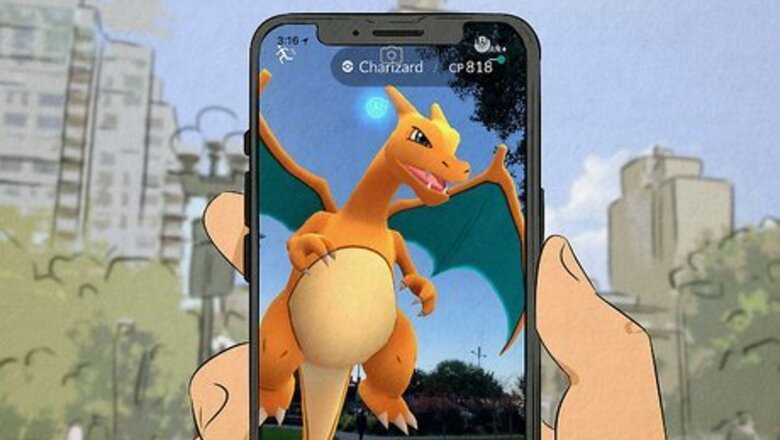
views
- Pokémon is not demonic—it’s a fun, cute game that people of all ages can enjoy.
- Satoshi Tajiri, Pokémon’s creator, never claimed that Pokémon was anti-Christian or satanic. This interview was false and never actually happened.
- Arguments that Pokémon is demonic, evil, or satanic are rooted in prejudice and religious bias rather than actual facts.
Is Pokémon evil and demonic?

No, Pokémon is neither evil nor demonic. Some anti-Pokémon advocates like to cite an old interview with Pokémon creator Satoshi Tajiri (originally posted on the Play4Real website back in 2012), where he allegedly describes Pokémon as the antithesis of Christianity, with the franchise backing the concept of Satanism. However, this interview is entirely false and carries absolutely no weight or authority on Tajiri’s motivations behind creating Pokémon. The P4R article was posted as a joke and wasn’t meant to be taken seriously. Unfortunately, many people took the article at face value and used it as fodder to spiritually condemn Pokémon (to the extent that popular myth-busting site Snopes wrote an article to dispute it).

Pokémon is a fun, family-friendly franchise that everyone can enjoy. In a verifiably real interview with TIME magazine back in November 1999, Tajiri explains how his original idea for Pokémon came from his childhood hobby of catching insects. As he designed the original game, he made intentional efforts to make the game appropriate for kids—for instance, having Pokémon “faint” rather than die upon losing all of their HP. During the interview, Tajiri is actually informed about how an American pastor compared Pikachu to the devil, to which Tajiri says, “I never heard of that.” It’s hard to believe that a game could be rooted in satanic, evil themes when the game’s creator isn’t even aware of said themes until an interview.
Mythbusting “Evil Pokémon” Claims

Myth: Pokémon opens kids up to witchcraft and the demonic. You might be familiar with an infamous video featuring a 90s-era pastor preaching about the satanic qualities of Pokémon. If you watch said video, all of the claims are entirely boundless, and the pastor offers no concrete evidence beyond baseless and prejudiced arguments (e.g., Pikachu’s tail is in the shape of a demonic “Z”). Just because the pastor expresses his beliefs with strong conviction doesn’t make them true. Plenty of other people share completely ludicrous viewpoints with extreme vigor and confidence (e.g., people who claim the earth is flat) even though these viewpoints are completely and unequivocally false.

Myth: Pokémon promotes animism. According to some Christian leaders, Pokémon supports the concept of animism, a specific type of spiritual belief that all types of nature are imbued with a spiritual essence. In “supporting” animism, such leaders allege that Satan can use Pokémon as a means of deception and spiritual warfare. The thing is, this simply isn’t true—Pokémon is a fantastical game that is acknowledged as such by its players. It bears no authority or power over a person’s relationship with God. From a purely Christian standpoint, one could make the argument that playing Pokémon constantly (or even religiously, if you will) is harmful in the sense that it takes away from a person’s time praying to God or studying the Bible. Still, this issue isn’t specific to Pokémon—it could apply to any activity that someone does frequently.

Myth: Certain Pokémon have satanic designs. In the anti-Pokémon sermon video, the pastor goes on to describe how certain Pokémon have satanic and evil design elements. This is completely false—objectively, none of the 1,000+ Pokémon in existence resemble any sort of satanic creature. (One does, however, resemble a giant ice cream cone.)
The Benefits of Pokémon

Pokémon GO encourages fitness and exercise. Pokémon GO, a mobile Pokémon game that gained immense popularity upon its release in 2016, invites players to walk around their local neighborhoods, parks, and cities to look for Pokémon, visit Pokéstops, and fight Pokémon gyms. Psychological experts also note that Pokémon GO’s instant reward system (e.g., catching a Pokémon) can have positive impacts on people struggling with mental illness (like anxiety). Some Christians have even mentioned how playing Pokémon GO allowed them to appreciate the world around them even more.

Pokémon games encourage logical thinking. At its core, Pokémon is essentially a complex, multi-faceted version of Rock Paper Scissors—as you journey across a fantastical region, you encounter Pokémon of different elemental types, which can be bested with specific types of elements. It’s a fun challenge for players to create a balanced and powerful team that can effectively defend against and defeat different types of Pokémon.

Pokémon is a great way to connect with friends and peers. Pokémon has undeniably become a core experience in the childhoods of many. Reminiscing about your past Pokémon adventures (or, better yet, playing Pokémon in the here and now) gives you a great jumping-off point for a fun conversation, or even a future friendship!




















Comments
0 comment